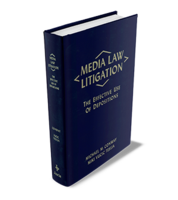|
|

|

|
Media Law Litigation: The Effective Use of Depositions
Pages:
ISBN:
Published On:
Updated On:
1174
InvtPart
Hardcover Book
Do Not Offer
Have a question? Email us about this product!
Available Format
|
Additional Information |
This is a "how-to" book on taking and defending depositions in defamation and media cases which addresses the newest trends and issues.
One of these is the increasing incidence of non-defamation “privacy” claims being litigated to redress what has traditionally been known as defamation injuries. The authors also address the constantly evolving issues arising out of advances in technology, such as claims based on broadcasts over the Internet and use of surreptitious surveillance equipment or wiretaps in newsgathering. While these areas are new and emerging, the law and corresponding discovery under that law is often rooted in well-established constitutional standards governing defamation claims, newsgathering, free speech and freedom to prosecute or defend claims. Therefore, this book discusses both the old and the new to provide assistance to practitioners faced with the complexities in the interaction of the two.
Given the complexity of the legal issues in defamation and privacy lawsuits, and the endless factual circumstances in which such claims may arise, no single book can address the myriad variations of important issues which may arise during discovery. The central message in this work, however, is that regardless of the specific facts relating to the claim and the particular legal elements applicable to the claim, deposition testimony may be the single most critical element of case preparation. Thoughtful use of the deposition process can result in pretrial rulings in favor of the defendant, on the one hand, or the development of strong evidence of potential liability of a defendant which can lead to a realistic settlement of the claim. Deposition-taking requires thought and planning.
Media Law Depositions includes actual depositions (Forms) conducted by the author from various topical areas of media law. Media Law Depositions will generate insight and understanding of some of the problems faced when conducting depositions; aid the practitioner in formulating solutions or approaches to the problems that confront him or her; and sharpen the practitioner’s skills in gathering deposition testimony in general.
The lawyer who understands the critical legal elements of the defamation or privacy claim and outlines a deposition strategy based upon that analysis will achieve the best outcome for his or her client. This book will assist in achieving that result.
Michael M. Conway is a Partner at Foley & Lardner LLP. He is the leader of the Chicago office's Litigation Department, leader of the firm's Media Law Group, and a member of the firm's General Commercial Litigation and Appellate Practices and Entertainment & Media Industry Team.
Mr. Conway is a fellow of the American College of Trial Lawyers and is listed in Chambers USA: America's Leading Lawyers for Business and The Best Lawyers of America. For more than 30 years, he has focused his practice on media, commercial, corporate and federal tax litigation with more than 170 reported decisions in the federal and state court systems. Mr. Conway has been principal trial attorney in a wide variety of civil matters. Recently the Seventh Circuit Court of Appeals affirmed summary judgment on behalf of The New York Times, New York Daily News and Boston Globe which Mr. Conway represented in a $125 million defamation lawsuit brought by Global Relief Foundation, an Islamic charity. The court of appeals ruled that the newspapers' articles, reporting on governmental investigations of Global for ties to terrorists, were substantially true. Global Relief Foundation, Inc. v. The New York Times, et al., 390 F.3d 973 (7th Cir. 2004). He has won libel cases for the Chicago Tribune, ABC, Kankakee Journal, Muhammad Ali, news magazines and other news organizations. In 2004, he obtained the dismissal of a suit based upon an Illinois newspaper's publication of the names on a state police list of sex offenders on the basis that an Illinois statute conferred absolute immunity against claims based upon the republication of such lists. The two appellate opinions in Desnick Eye Center v. ABC – both argued on appeal by Mr. Conway – provide important protections for news organizations from liability for claims related both to news gathering and news content. Desnick Eye Services v. ABC, 233 F.3d 514 (7th Cir. 2000) and 44 F.3d 1345 (7th Cir. 2005).
Miki Tesija is a Partner in Foley's General Commercial Litigation Practice Group and the Entertainment & Media Industry Team. Her practice includes a wide range of litigation, including federal and state securities, media law, real estate, contracts, accounting practices, director and officer liability, and other business disputes.
|
|
|
|
|
|